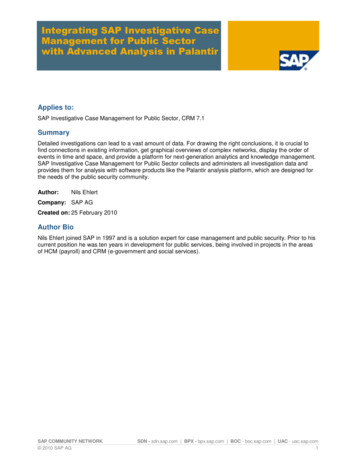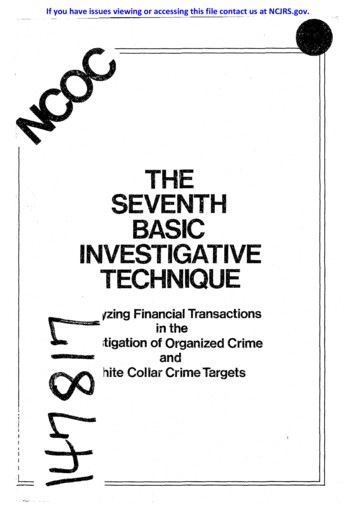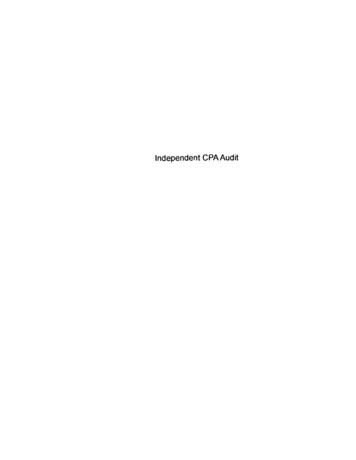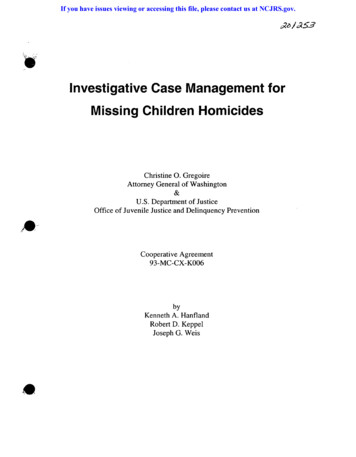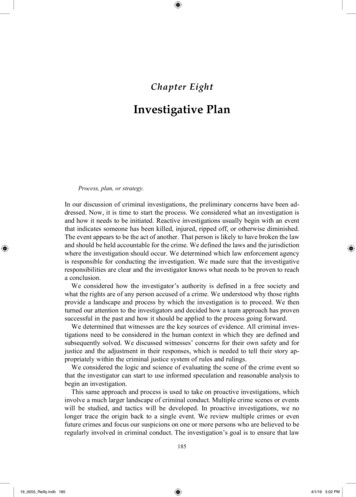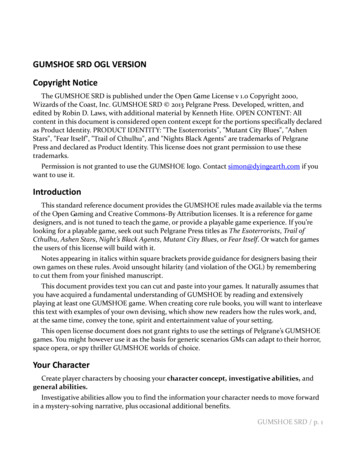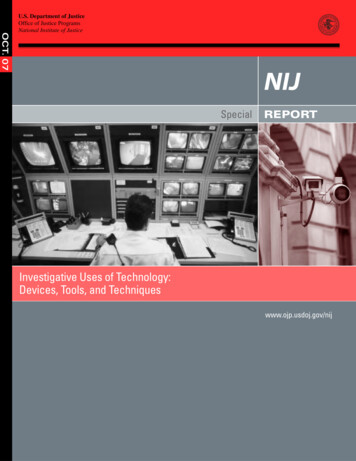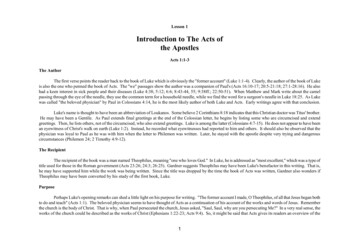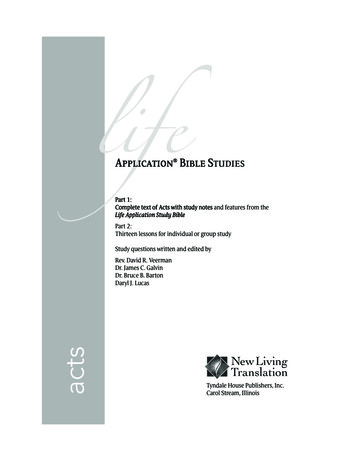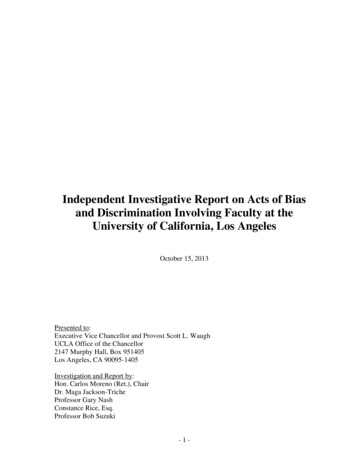
Transcription
Independent Investigative Report on Acts of Biasand Discrimination Involving Faculty at theUniversity of California, Los AngelesOctober 15, 2013Presented to:Executive Vice Chancellor and Provost Scott L. WaughUCLA Office of the Chancellor2147 Murphy Hall, Box 951405Los Angeles, CA 90095-1405Investigation and Report by:Hon. Carlos Moreno (Ret.), ChairDr. Maga Jackson-TricheProfessor Gary NashConstance Rice, Esq.Professor Bob Suzuki-1-
EXECUTIVE SUMMARYSeveral high-profile incidents of racial and ethnic bias and/or discrimination haveroiled the University of California, Los Angeles (UCLA) campus in recent years. In 2012,the UCLA Chancellor and Executive Vice Chancellor and Provost were approached by agroup of concerned faculty about perceived racial bias, discrimination and intolerance at theuniversity. In response to these concerns, Chancellor Gene Block authorized ExecutiveVice Chancellor and Provost Scott L. Waugh1 to appoint an independent review team toconduct an assessment and present recommendations to address issues that the teamdiscovered. Executive Vice Chancellor Waugh, in cooperation with faculty, formed theExternal Review Team to undertake this task.This report is the culmination of several months of investigation regarding theuniversity’s policies, procedures, and mechanisms for responding to incidents of perceivedbias, discrimination, and intolerance at UCLA involving faculty of color—including inhiring and advancement decisions. The Review Team interviewed twelve universityadministrators and eighteen faculty members who were willing to share their candidperspectives. We thank these individuals for their time and commitment to this importantissue. The Review Team also conducted a town hall meeting and solicited writtensubmissions from concerned faculty. In additional to anecdotal evidence, the Review Teamreviewed UCLA’s written policies and gathered statistics on recorded incidents of racial biasand discrimination against faculty.UCLA is an institution that, by its own account, is “firmly rooted in its land-grantmission of teaching, research, and public service.”2 It is located in Los Angeles, one of themost ethnically diverse cities and counties in the United States. Despite these facts, wefound widespread concern among faculty members that the racial climate at UCLA haddeteriorated over time, and that the university’s policies and procedures are inadequate torespond to reports of incidents of bias and discrimination. Our investigation found that therelevant university policies were vague, the remedial procedures difficult to access, andfrom a practical standpoint, essentially nonexistent. Faculty of color at UCLA must rely ona patchwork of diversity resources and the generic Faculty Senate complaint and grievanceprocedures in order to seek redress. While this ad hoc process has sometimes succeeded, ithas failed to adequately record, investigate, or provide for disciplinary sanctions forincidents which, if substantiated, would constitute violations of university nondiscriminationpolicy.There was clear consensus among faculty members who reported to the ReviewTeam that the administration has demonstrated a lack of leadership on these issues. Facultyidentified two main perceived barriers to implementation of changes. First, the primacy offreedom and autonomy for faculty members that characterizes a major research institution.Second, the competition among elite institutions for talented faculty members, particularly1Hereafter, “Executive Vice Chancellor Waugh.”22009 Chancellor’s Advisory Group on Diversity, Draft UCLA Strategic Plan forDiversity 1, available at https://diversity.ucla.edu/strategicplan/20092010 CAGD Strategic Plan.pdf.-2-
those adept at procuring grant dollars. While these are legitimate concerns for theadministration, they cannot be prioritized to the exclusion of all other issues. UCLA is aworkplace like any other, and adequate processes must exist to ensure that the faculty hasopportunities and avenues for redress when faced with incidents perpetrated by colleaguesand coworkers that create an intimidating, hostile, or offensive work environment.As detailed below, we conclude that UCLA’s policies and procedures for respondingto incidents of perceived bias, discrimination and intolerance involving faculty areinadequate. The university administration must work to find solutions to this problem. Theformation of the Review Team is an encouraging first step, but the UCLA leadership musttake more action to reform and give teeth to its enforcement of existing nondiscriminationpolicies. Our recommendations for reform include:I. Enhancing procedures to provide a standardized process for investigation ofincidents of perceived bias, discrimination, and intolerance, and for referralof the matter, if necessary, to the appropriate local disciplinary regime. Implementation of educational and training programs that aim to preventsuch incidents from occurring in the first place, and provide for recordkeeping in order to monitor the problem moving forward. Creation of a single Discrimination Officer who, assuming that the universityprovides adequate resources, can fulfill these important functions ofeducation and training, informal and formal investigation and fact-finding,and record-keeping.INTRODUCTIONA.Background & ChargeIn recent years several incidents of racial bias and/or discrimination have occurredon the UCLA campus and garnered public attention. Subsequent university press releasesregarding the incidents, as well as statements by UCLA Chancellor Block, also receivedattention.The incidents and the subsequent statements by UCLA officials, causedconsternation among certain faculty members of color at the university. On June 15, 2012,roughly thirty such concerned faculty members sent Executive Vice Chancellor Waugh aletter in which they requested a review of the campus racial climate, as well as theappointment of an independent review committee to address the university’s policies andprocedures for responding to incidents of racial bias on campus.Executive Vice Chancellor Waugh met with the concerned faculty membersregarding their request in summer 2012, and discussions between the parties concerning thescope of the review continued until November 2012, when they reached agreement on theReview Team’s charges and the membership. On November 24, 2012, the Review Teamreceived its charge letter from the Executive Vice Chancellor. The charge was to carry outthe following tasks:-3-
Assess the efficacy and appropriateness of existing university mechanismsand procedures for addressing faculty concerns about perceived acts of bias,intolerance, and discrimination at the UCLA campus. Review and assess how existing policies and procedures address facultyconcerns about perceived acts of bias, intolerance, and discrimination in thehiring and advancement of faculty at the UCLA campus. Recommend changes and additional reviews, if appropriate, to improve theUniversity’s understanding of faculty concerns about perceived acts of bias,intolerance, and discrimination at the UCLA campus. Identify and explore incidents of alleged racial and ethnic bias ordiscrimination experienced by UCLA faculty since 2007 and assess andreview how such claims have been addressed by the university’s mechanismsand procedures for resolving such claims. Solicit comments from the UCLA community about such incidents andassess the manner in which resolution or redress was achieved. Prepare a written report to the university on the Review Team’s findings andrecommendations with respect to the above matters.While the results of the Review Team’s work are intended to be public, it isimportant to note that our recommendations are purely advisory and are not binding on theExecutive Vice Chancellor or UCLA.B.MethodologyThe Review Team decided on a basic methodology for its work during an initialmeeting in November 2012. First, conduct a review of UCLA’s written policies, proceduresand mechanisms for handling incidents of racial or ethnic bias. Second, gather informationabout the real-world implementation of those policies from those who filled the relevantadministrative positions. Third, solicit input from UCLA faculty about their experiences—both in written form and through interviews or in a town hall meeting. Finally, gather andreview any information available from institutional sources about past allegations or reportsof incidents of racial bias or discrimination.We gathered public information about existing policies, procedures and mechanismsfor responding to incidents of perceived discrimination from UCLA’s web site. Throughthis process, we also identified some institutional stakeholders to interview. Additionalinterviewees were identified by the Executive Vice Chancellor’s office, and included manyof the concerned faculty.Attorneys from Irell & Manella LLP, which was engaged by the university toconduct this investigation along with the Review Team, interviewed twelve individuals-4-
regarding the implementation and functioning of UCLA’s relevant policies and procedures.These individuals included staff administrators and faculty members in administrative orAcademic Senate leadership positions whom had served in their positions during the periodof 2007 to the present. Irell & Manella conducted individual interviews with eighteenladder-rank faculty members, the majority of whom were faculty of color. Three seniorfaculty members presented their views and experiences directly to the Review Team duringan April 2013 meeting. We also conducted a town hall meeting on the UCLA campus thatwas attended by approximately 50 faculty and administration members, and solicitedfaculty members to share their thoughts on the university’s racial and ethnic climate and itsprocedures for addressing incidents of perceived bias, discrimination and intolerance. Tenfaculty members submitted written statements.The Review Team received data from the Office of Ombuds Services at UCLA andthe UCLA Academic Senate regarding reports of perceived acts of racial or ethnic bias,discrimination and/or intolerance at UCLA from 2007 to the present. The Review Team isthankful to all—administrators, staff, and faculty—who took time to speak with us.II.FINDINGSA.The University of California and UCLA Already Have PoliciesRegarding NondiscriminationUnsurprisingly, the University of California (UC) has an official policy forbiddingdiscrimination against or harassment of any person employed or seeking employment withthe University of California on the basis of, among other things, race, color, national origin,ancestry, or religion.3 University policy also prohibits retaliation against any employee orperson seeking employment for bringing a complaint of discrimination or harassmentpursuant to this policy.4Similarly, the UCLA Faculty Code of Conduct prohibits discrimination by a facultymember against any university employee or another faculty member for reasons of race,color, ethnic origin, national origin, or ancestry.5 Violations of the Code of Conduct mayresult in sanctions after a disciplinary process in accordance with Academic Senate bylaws.The Committee on Privilege and Tenure is charged with investigating grievances arisingfrom incidents of bias, including those based on race.63University of California Academic Personnel Manual, Affirmative Action andNondiscrimination in Employment § 35(a).4Id.5University of California Academic Personnel Manual, Faculty Code of Conduct §15, Part II § C(5), D(2).6UCLA Website, Academic Senate, Committees, Privilege & 5-
B.Existing University Procedures and Mechanisms for Responding toIncidents of Perceived Bias and Discrimination1.IntroductionWe find that to make a complaint or bring a grievance, faculty members are facedwith multiple apparent paths. They may seek to address the issue through campus resourcesput in place for minority faculty, or alternately through the university’s general facultycomplaint and grievance process. UCLA has numerous overlapping resources that fill thesetwo spaces. Faculty members most consistently addressed their concerns to the Office ofDiversity and Faculty Development and its analog, the David Geffen School of Medicine’sOffice of Diversity Affairs. Some faculty instead raised their concerns with the Office ofthe Ombuds Services. These offices have engaged in informal resolution of hiring andadvancement issues involving minority faculty, as well as data collection regarding facultydiversity issues.Our review suggests that UCLA’s reaction to a report of a perceived incident of biasor discrimination directed toward a faculty member has consistently been to attempt toremedy the problem by making whole the injured faculty member, without anyrepercussions to the offending party. We find that a significant reason for this failure isUCLA’s lack of a centralized resource for responding to incidents of bias and discriminationexperienced by faculty members. Current university procedures tend to treat such reportseither as interpersonal conflicts or nascent hiring, advancement, and tenure disputes.Accordingly, current procedures emphasize informal resolution over formal investigationinto potential violations of university policy.Furthermore, all of these offices, and the other campus resources to which welearned that faculty members of color make reports, lack the authority or the resources toinvestigate and make findings regarding incidents of perceived discrimination as violationsof university policy. At most, they can, and on occasion do, refer complainants andgrievances to the appropriate formal Academic Senate processes that offer formalinvestigation and fact-finding. However, since substantial deterrents exist to institutingformal Academic Senate proceedings as discussed below, the university’s currentprocedures focus exclusively on remedies at the expense of investigation, fact-finding anddisciplinary sanction.2.Formal Processes(a)Governance SystemCodified by the UC Regents in 1920, the Academic Senate is the vehicle throughwhich faculty share in the operation and management of the university. The Senate isdelegated authority over a range of matters, including degree and enrollment requirementsand program establishment, disestablishment, and review. The Senate also has a formaladvisory role in academic personnel actions. According to the UCLA website, “[t]heAcademic Senate’s efforts derive from the premise that the university’s excellence cannot be-6-
sustained without faculty, administration, staff, and students all making substantivecontributions to the university in an involved, respectful and collaborative fashion.”7(b)Formal Academic Senate CommitteesThe Academic Senate provides for a faculty grievance process, governed byAcademic Senate Bylaw 335.8 Grievances are defined as a complaint that any specificadministrative act was arbitrary or capricious or violated applicable University rules,regulations, or personnel policies and adversely affected the individual’s rights.9 Grievancesare handled by the Committee on Privilege and Tenure (also referred to as the Privilege andTenure Committee). Another committee, the Committee on Charges (also referred to as theCharges Committee), handles disciplinary actions against faculty members.As part of its duties, the Charges Committee reviews charges of alleged violations ofthe Faculty Code of Conduct, including the sexual harassment policy, by faculty members.Anyone may bring a complaint to the Charges Committee if the complaint concerns analleged violation of one or more provisions of the Code. The Committee may require thecomplainant to exhaust administrative remedies and to determine that no satisfactoryresolution can be implemented at the departmental or college level.10If, after an informal hearing,11 the Committee makes a finding of ‘probable cause’ ofviolation of the Code, it transmits the complaint to the Vice Chancellor of AcademicPersonnel who in turn refers the complaint to the Privilege and Tenure Committee, whichholds formal hearings and makes recommendations to the Chancellor on disciplinarysanctions. Some verbal complaints are fielded and resolved informally.12The Privilege and Tenure Committee makes recommendations to the administrationin disciplinary, grievance, and early termination matters involving Senate members. Facultymembers complaining about UCLA administrative actions file their complaints directly withthe Privilege and Tenure Committee. Grievances may be concerned with alleged proceduralirregularities in the academic personnel process, including prejudicial action based on race,7UCLA Website, Academic Senate, An SharedGovernanceOverview.htm.8See generally Bylaws of the Academic Senate, University of California, Part III, §335, available at l/blpart3.html#bl335.9Campus Counsel, Resource Guide: Faculty Grievances and Discipline § utlineGrievancesversuDiscipline3.pdf.10UCLA Website, Academic Senate, Committees, ges/.11Id.12UCLA Website, Academic Senate, Committees, Charges, Charges InformationalPacket, Charges Committee es/bylaws.htm.-7-
religion, or sex.13 In the case of alleged violations of the Faculty Code of Conduct, theCommittee conducts formal hearings after the Charges Committee has made a ‘probablecause’ determination. After a formal hearing, the Committee delivers a report to theChancellor, including a recommendation of sanction. The Chancellor then makes a finaldecision in the matter.14 The Academic Senate’s role in personnel actions is, ultimately,advisory.These Academic Senate committees reported receiving few complaints or grievancesinvolving perceived acts of discrimination, bias or intolerance. The Privilege and TenureCommittee reported that it receives three to four grievances of any kind a year, and resolvesmost matters informally by speaking to the grievant and the other parties separately. Formalproceedings are rare; for instance, the Privilege and Tenure Committee reports that it hasheld only one formal hearing in the past two-and-a-half years. These committees reportedthat typically such processes take one to three months to conclude, although otheradministration officials characterized the process as taking much longer.The Academic Senate provided statistics to the Review Team regarding complaintsfiled with its formal committees from the period of 2007 to the present. During this time,two charges of perceived discrimination brought by faculty members were filed with theCharges Committee. One of the formal charges filed by a faculty member, brought in the2011-2012 academic year, claimed that another ladder-rank faculty member had engaged indiscrimination on the basis of race or ethnicity both against the complainant faculty memberand a graduate student.15From 2007 to the present, the Privilege and Tenure Committee heard one caseinvolving allegations of racial or ethnic discrimination. The case was adjudicated during the2008-2009 academic year and involved the filing of a formal charge by the Vice Chancellorfor Academic Personnel against a ladder-rank faculty member. Among other violations ofthe Code of Conduct, the subject of the hearing was perceived to have harassed anddiscriminated against a staff member on the basis of race. The Privilege and TenureCommittee recommended, and the Vice Chancellor found, that the faculty member inquestion had violated the Code of Conduct.1613UCLA Website, Academic Senate, Committees, Privilege & 4UCLA Website, Committees, Grievance Advisory Committee, GrievanceAdvisory Committee Manual, Appendix XII, §§ 9 (D), /appxii.htm.15Several key administration officials who discussed this case remarked on the factthat the allegedly offending faculty member was in fact also a member of anunderrepresented minority group.16Appendix A contains a flowchart illustrating the current process, including theinformal processes discussed in the following sections.-8-
(c)UCLA Office of the Campus CounselThe Office of the Campus Counsel notes on its website that it “supports the diverseand dynamic educational environment of the University of California Los Angeles, byproviding legal advice and assistance related to the activities of the UCLA campus and itsprofessional schools.”17 According to the university, reviewing, investigating, and advisingcampus leadership on responses to discrimination falls within the purview of the Office.(d)Sexual Harassment Officer/Title IX OfficerWe learned that the university has also begun utilizing UCLA’s Sexual HarassmentOfficer to investigate charges of acts of racial bias or discrimination that reach the stage offormal Academic Senate processes.18 The current Sexual Harassment Officer is an attorneyand was formerly a lawyer for the Los Angeles district office of the Equal OpportunityEmployment Commission. She stated that she has undertaken three such investigationssince 2007.3.Informal Procedures(a)Vice Provost for Diversity & Faculty DevelopmentWe learned that faculty often took reports of incidents of perceived discrimination orbias to the Vice Provost for Diversity & Faculty Development (commonly referred to as the“Vice Provost for Faculty Diversity”) or her medical school analog, the Associate Dean forDiversity Affairs at the David Geffen School of Medicine. The Vice Provost is the chiefofficer of the Diversity & Faculty Development Office, which states that its mission is toprovide “academic leadership for achieving and sustaining faculty diversity,” and that itfulfills this mission by “educating, communicating, and collaborating with the faculty andadministrators on campus on all aspects of faculty diversity.” It also seeks to provideresources to promote faculty development and diversity.On its website, the office provides a link to the Office of Academic Personnel pagefor complaints and grievances, which informs complainants of the informal and formalgrievance resources available. The Diversity & Faculty Development Office also provideslinks to external compliance agencies which complainants can contact regarding filing acomplaint of discrimination, including the Los Angeles district office of the United StatesEqual Employment Opportunity Commission.The Vice Provost reported that she receives complaints and grievances from facultymembers. She stated that she received six to eight such complaints a year. Most involvedtenure matters, and therefore came during the times each year when tenure is granted. Most17UCLA Website, Office of the Campus Counsel ml.18The university’s use of the Title IX Officer in this regard appears to mirror its useof her regarding complaints regarding sexual harassment filed with the Charges Committee.See UCLA Procedure 630:1: Responding to Reports of Sexual Harassment § VI.-9-
of these complaints involve gender, with some sexual orientation and some disabilityrelated. A small number are race or ethnicity based. She stated that her offices did not keepofficial records of complaints, but that she recalled four complaints involving perceiveddiscrimination since her tenure began in 2010. Two of the matters were resolved withtenure grants, one through the Academic Senate processes, and one informally throughintervention with a department chair. The other two matters remain unresolved. The ViceProvost said that she refers about two to four complaints a year for further investigation orinstitution of formal Academic Senate grievance processes. Her predecessor recalled onlytwo complaints regarding incidents of perceived discrimination from 2002 to 2010 thatresulted in the filing of formal Academic Senate charges. Any other complaints wereresolved informally.The current Vice Provost characterizes herself as a “fixer” for faculty members. Shemeets with faculty members to hear their concerns and in some cases seeks input fromExecutive Vice Chancellor Waugh to “assert moral suasion” on a problem. She oftenattempts to resolve issues informally by placing a call to a dean or department chair. Unlikethe UCLA Ombud, the Vice Provost may be required to report certain activities undertakenby her office to the Executive Vice Chancellor and Chancellor. However, she noted that sheinitially keeps a matter to herself while she attempts to resolve it informally. If she believesthat a matter warrants further investigation, she may refer it to the Executive ViceChancellor or the Office of Campus Counsel.The Associate Dean for Diversity Affairs at the David Geffen School of Medicinealso reported that her office fields complaints and grievances from minority facultymembers in the health sciences. She stated that the vast majority of these complaints did notallege overt instances of racial bias or discrimination—in fact, the office has received onlyone such complaint since 2009. Normally, the complaints by minority faculty membersinvolve a variety of topics: a desire for mentoring, complaints of lack of support andadequate finances for carrying out work, the feeling that something was promised to thefaculty member that was not delivered, interpersonal conflicts, reports of intimidation,misunderstanding and complaints of feeling unappreciated. The Associate Dean emphasizedthat the majority of the complaints involved either funding or other job status issues. Sheestimated that she was able to informally resolve about half of the complaints, and referredthe rest of the complainants to the Academic Senate processes.(b)Office of the Ombuds ServicesThe UCLA Office of Ombuds Services offers informal and confidential services inresolving conflicts, disputes, or complaints. It is independent and neutral, and attempts tofacilitate communication and assist parties in reaching their own mutually-acceptableagreements. The Ombud may engage in informal fact-finding, clarify issues, expediteprocesses or initiate mediation. If the Ombud detects a trend or pattern in conflicts orconcerns, it may make recommendations for review or change in policies or procedures.The Office of the Ombud serves three main constituencies: students (40%), staff(40%) and faculty (11-12%), with the remainder being members of the campus community,such as parents. Clients initiate contact by calling the office or walking in. The Ombudcharacterized the function of her office as “pointing complainants in the right direction.”- 10 -
She stated that she may either recommend formal processes or informal ones. She statedthat some complainants may either desire to pursue a remedy, or “just want to talk.” Shestated that in an effort to resolve matters informally, she may sometimes engage in “shuttlediplomacy.” She has spoken to department chairs or deans on behalf of faculty. TheOmbud reported that the number of complaints initiated by faculty members of color hasbeen increasing annually. Although the office did not consistently gather ethnicity databefore 2011, the office estimated that from 2007 to 2011, the number of self-reporteddiscrimination cases brought to the office averaged one to two per year, and were most oftengender cases brought by Caucasian female faculty.In 2011-2012, the office reported it received thirty complaints by minority facultymembers, seventeen of which came from Academic Senate members. Of these complaints,fifteen (50%) were by Asian or Asian-American faculty members, five (17%) were byMiddle Eastern faculty members, four (13%) by Chicano/Latino faculty members, three(10%) by African-American faculty members, and three (10%) other ethnic minorities. Ofthe thirty complaints in 2011, six involved “general incivility,” four “discrimination,” andthree “bullying.” The Ombud noted that the increase in complaints by minority facultymembers might be due to the Office’s hiring of an Ombudsperson to directly serve theCenter for Health Sciences. The Office stated that all of the self-reported discrimination,incivility and bullying cases were given referral information on how to further address theirconcerns.(c)Grievance Advisory CommitteeThe Grievance Advisory Committee (GAC) is operated by the Academic Senate andprovides an informal process for members of the campus community to resolve complaintsor grievances. The members of the GAC are all former Privilege and Tenure or ChargesCommittee members.19 Academic Senate staff informed us that when an individual hasquestions about individual rights or privileges or is considering bringing a grievance, he orshe may contact the Academic Senate Coordinator for the GAC, who will refer theindividual to a GAC member who will advise the complainant on policy and procedure,which standing committee to approach and how to proceed with a case. All advice isconfidential. Academic Senate staff stated that while complainants are often advised toexhaust their complaints before their department or school, they are not required to do so ifthe complaint involves the department chair or a dean.Because GAC members meet individually with complainants under confidentialcircumstances, GAC members are not collectively aware of the number or nature ofcomplaints. Academic Senate staff stated that two complaints of incidents of perceived biasand discrimination have been brought to the GAC since 2003. Of these, one resulted in aformal process before the Privilege and Tenure Committee that resulted in disciplinarysanction against a tenured faculty member for discriminatory conduct toward a staffmember, and the other involved a charge recently dismissed by the Charges Committee,after an investigation by the university
Oct 15, 2013 · UCLA is an institution that, by its own account, is “firmly rooted in its land-grant mission of teaching, research, and public service.” 2 It is located in Los Angeles, one of the most eth
